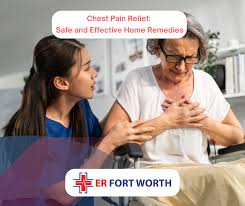


Discover the top 10 chest pain remedy techniques that actually work. Learn medications, and when to seek emergency help from ER OF FORT WORTH.
Chest pain can be alarming. While some causes are harmless, others may require immediate medical attention. In this article, we’ll explore the most effective and scientifically backed chest pain remedy options, helping you make informed decisions about your health and safety. Whether you’re dealing with mild discomfort or recovering from a major health episode, these remedies will guide you toward relief and prevention.
Brand: ER OF FORT WORTH
Your trusted emergency care provider for quick, compassionate, and expert treatment.
Chest pain is any discomfort in the chest area, often mistaken as heart-related. However, it can stem from digestive issues, muscle strain, lung problems, or anxiety. Here’s a breakdown of common causes:
Angina
Heart attack
Pericarditis
Aortic dissection
Gastroesophageal reflux disease (GERD)
Muscle strain
Panic attacks
Pulmonary conditions (e.g., pleurisy, pneumonia)
While home remedies can provide relief, seek immediate care at ER OF FORT WORTH if:
Pain is severe or crushing
Radiates to arms, neck, jaw, or back
Accompanied by shortness of breath, nausea, or sweating
You have a history of heart conditions
Antacids: Neutralize stomach acid (e.g., Tums, Rolaids)
H2 blockers or proton pump inhibitors: Reduce acid production
Ibuprofen or Naproxen: Help reduce inflammation and ease muscle pain
Inhale deeply through your nose, hold for 5 seconds, exhale through the mouth. Helps reduce anxiety-related chest pain.
Breathe into your belly rather than chest to improve oxygenation and calm nerves.
Tighten and release muscle groups from head to toe to relieve physical tension.
Relieves muscular tension in the chest wall.
Improves circulation and reduces stress levels.
Child’s Pose: Relieves tension
Cat-Cow Stretch: Improves flexibility
Bridge Pose: Opens chest and eases tightness
Spicy, fatty, and acidic foods
Caffeine and alcohol
Carbonated drinks
Fiber-rich foods
Lean proteins
Green leafy vegetables
Healthy weight
Proper posture during meals
Sleeping or sitting the right way can help avoid pain caused by acid reflux or strained muscles.
Elevate the head while sleeping to reduce nighttime reflux
Use ergonomic chairs for better posture
Avoid lying down right after eating
Dehydration can worsen muscle cramping and cause discomfort.
Smoking irritates the lungs and damages heart function.
Drink at least 8 glasses of water a day and avoid all tobacco products.
Chest pain from anxiety is often confused with heart issues. Address emotional health:
Practice mindfulness meditation
Engage in therapy or counseling
Try cognitive behavioral therapy (CBT)
Use guided imagery apps
Routine checkups help in early detection of serious conditions. Consult your provider if you have:
A family history of heart disease
High cholesterol or blood pressure
Diabetes or obesity
Our expert team is available 24/7 for screenings, tests, and quick intervention when chest pain strikes.
If you’re prone to chest pain:
Keep emergency contact numbers handy
Store nitroglycerin (if prescribed) in your bag
Know the nearest ER – such as ER OF FORT WORTH
Yes, if it’s caused by muscle strain or mild acid reflux. But persistent or severe pain should never be ignored.
Yes, for non-cardiac causes like muscle pain, but always consult a doctor if unsure.
Absolutely. Anxiety can lead to chest tightness, palpitations, and shallow breathing, which may feel like cardiac pain.
If the pain is severe, radiating, or accompanied by dizziness, shortness of breath, or sweating, visit ER OF FORT WORTH immediately.
Yes, remedies like ginger tea, baking soda water, and breathing exercises can help with minor chest pain.
Chest pain can range from harmless to life-threatening. Recognizing the cause, trying the right chest pain remedy, and seeking timely medical attention is crucial. If in doubt, trust the professionals at ER OF FORT WORTH for fast and reliable care. Never take chest pain lightly—your health is worth every precaution.
For more blogs visit https://paidforarticles.in/top-10-reasons-er-of-fort-worth-is-the-best-choice-for-urgent-care-fort-worth-texas-816934
